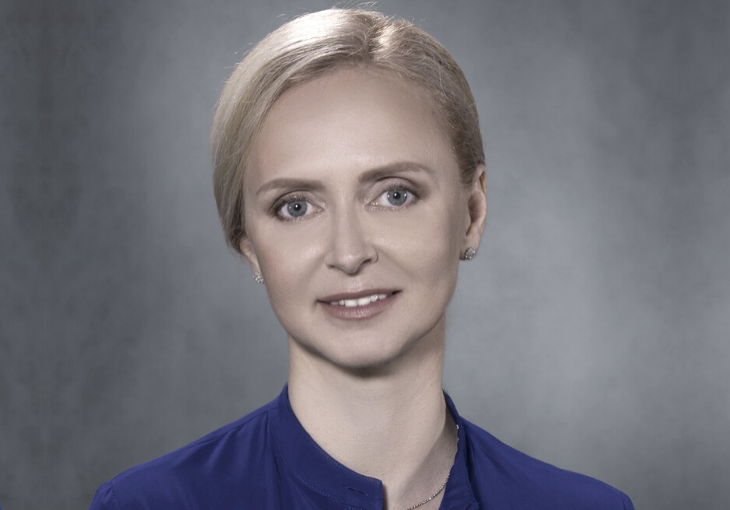«We shall keep our sales offices: true emotions can only be communicated live»
Interview with Anna Boim, Commercial Director of A101 Group

About career path
Sergey Razuvayev: Anna, tell us about how you became the commercial director of A101 Group. What was your professional path like?
Anna Boim: I approached the real estate industry in 2003 when I started working for Glavstroy company as a marketing analyst, and then I was promoted to become a marketing director there. Over the years, I worked for FSK Group, ViKomo, Kortros Group where I set up departments of marketing and sales, customer support, after-sales, mortgage lending, CRM, product development, i.e. everything that provides the company with revenue items, from scratch. In the autumn of 2015, I left for Sochi to sell apartments of the Olympic heritage in Imeretinsky Resort District, and then I took a job with A101 Group in 2017.
About different approaches of commercial directors
S. R.: They say the approaches and methods of commercial directors coming from marketing backgrounds are different from those of specialists coming from sales. What are your thoughts on the matter?
A. B.: I agree with that. People who originally were marketing specialists evaluate the entire transaction chain. For them, the sales process begins with customer acquisition. Thus, attracting the maximum number of buyers at a minimum expense is already their responsibility. They calculate the return on investment ratio, analyze competitors, monitor their behavior in the market, and, of course, come up with how to keep ahead of the game.
For a commercial director "from sales", the most important thing is clear compliance with regulations and fulfillment of set targets. On the other hand, they should understand customer psychology. They can capture their moods, reactions, and emotions, understand how best to talk to them, how to vary scripts to identify needs, how to respond to objections.
S. R.: Can you notice how these differences in approaches in practice?
A. B.: A commercial director "from sales" is more focused on the segment of work that starts with an incoming call and ends when the agreement is signed. While for a one "from marketing background" a transaction begins with identifying the customer's needs and lasts up to the interaction with those who already live in the built housing. This means that a marketing specialist doesn't stop communicating with the buyers if the developer continues to build in the location. This is how word of mouth is generated, so we actively work with our dwellers: we create loyalty programs, organize seasonal holidays, work with businesses that enter our site, and unite their interests. In a nutshell, we try to create the atmosphere of a happy life as far as we can.
S. R.: Which commercial director, in your opinion, is stronger and more useful for a developer: from sales or marketing background?
A. B.: The one who spends less and produces more money!
 Scandinavia Housing Estate, A101 Group
Scandinavia Housing Estate, A101 Group
About metrics in the dashboard
S. R.: Let's now talk about your management technique. How does your dashboard look like? What metrics do you monitor daily? Which ones don't you track so strictly?
A. B.: Already at 8 in the morning, I look through calls, bookings, current plan performance, and forecasts. I am interested in everything that is happening in the sales funnel and, of course, cash inflow. Recently, I have also been paying regard to dissolution numbers.
S. R.: Which of the KPIs, in your opinion, will require particularly close attention in the next quarter given the current circumstances?
A. B.: I suppose that at least until the end of the summer, commercial directors need to keep track of the cash inflow, negotiate with banks on switching to electronic registration of loan agreements, automate transactions.
However, in the current situation, it is also important to understand how customer behavior is changing, how the product should change, and what will happen to street retail. It is very interesting to observe young people now. It seemed to many that they could rent an apartment for a lifetime. But one day they find themselves in a situation that tomorrow they can't afford to pay rent anymore. It is then that the thoughts on buying even if a small, but own apartment appear.
S. R.:Let's get back to the cash inflow. We often hear from CEOs and owners that it is not so relevant for the business in the current circumstances.
A. B.: Yes, if the company applies escrow accounts.
On evaluating the performance of a commercial department
S. R.: Anna, let's imagine that I want to consult with you. For example, I am the owner of a regional company. And I ask you: please look and tell me whether my commercial department performs well or not. Can you name 3-5 key metrics that you measure against?
A. B.: To begin with, we need to understand the pricing principles of the region in terms of construction and installation work and advertising tools. I will definitely need a competitive analysis of sales and advertising. Then I would look at such figures as debt/EBITDA ratio, profit margin, and number of meters sold per year. I would also look at the sales pattern and composition of the commercial segment. And the return on investment ratio for sure: how much money the company spends to earn one ruble.
S. R.: Frankly speaking, I think this is already the level of the owner's evaluation, i.e. a higher one than that of a commercial director…
A. B.: But it is here that we need to dig a little deeper. A commercial director may say: if we want to sell a certain amount at such and such price, we need to allocate 9% of the revenue plan for promotion and marketing because everyone in the market does like this. But who has ever said it's right? It is necessary to define procurement prices, to calculate whether the money was spent correctly.
There can be another story as well: a company fulfills its plans, even exceeds them, makes 120-130%, so it is obvious that everyone is happy. In fact, it only means that it didn't raise prices in due season. But you should make the most of every meter!
On the automation of processes in A101 Group
S. R.: Which processes in the work of a commercial director should be automated, and what requires manual control and personal participation?
A. B.: If it was up to me, I would automate everything. But, unfortunately, this is not yet possible.
Now we have fully implemented a digital mortgage tool. We were the first to launch electronic registration, which we made together with SmartDeal. Previously we applied DomClick, but we found a way to conduct transactions much cheaper..
Now only 7% of our transactions are executed in the "paper" form. It can be stated that we have completely switched to electronic execution and registration of transactions. During self-isolation, we completely switched to electronic loan agreements with banks, we have already executed some completely remote transactions with mortgage debt with four banks.
Besides that, we launched A101 Business platform with a map where you can see which businesses are open, where they are located, which ones are going to open, and franchisees can pre-select and accept a space with a full understanding of which franchise it is suitable for.
 Spanish Urban Blocks, A101 Group
Spanish Urban Blocks, A101 Group
S. R.: What a scale! And how much automation lends itself to partner channels?
A. B.: It has also been switched to online mode. We have implemented a program for selling through brokers with NMarket.PRO, Metris, and several other platforms that allow us to publish presentations of our projects online.
We also conduct online seminars for brokers based in other cities. Now we are collaborating with 58 cities, and I think the figure will reach 70 this year. We remotely teach them how to sell our projects. Also, our partner channel involves sales to large companies we interact through personal accounts with.
S. R.: It's impressive. Is there still something that cannot be automated?
A. B.: Actually, the sales themselves. I don't consider total automation necessary here. Buying an apartment in our country is still a big event accompanied by quite strong emotions. People should remember the moment of receiving their keys.
True emotions can only be communicated live. Therefore, we'll always keep our sales offices. And salespersons will always be people, not robots.
On the evolution of the job of a commercial director
S. R.: Commercial director in 2017–2019, now and beyond, in 2023: are these all different types of managers? Should you change somehow?
A. B.: I suppose the main thing that changes is technology. I can feel it myself. It was so important for me to puzzle this all out that I even enrolled in a Digital MBA program. I just gained insight on the processes we could automate and how much better we could work with our customers. Now there are still many things to do and improve since our prospects have become clear to me.


